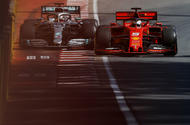Vettel rejoined circuit just ahead of Hamilton
Sebastian Vettel’s contentious penalty for his Canadian Grand Prix moment has sparked plenty of debate
Several of us were talking about the Canadian Grand Prix in the office this morning – or, specifically, the penalty that cost Sebastian Vettel victory and handed Lewis Hamilton his fifth win of 2019.
One of my colleagues proffered that it was another example of Formula 1 shooting itself in the foot. I disagreed with that point, for one simple reason: because we were all talking about the Canadian Grand Prix.
If you somehow missed it, Vettel was leading the race in his Ferrari, pushed hard by the Mercedes of Hamilton when, on lap 48, he lost control turning into the fast Turn 3/4 chicane, sliding onto the grass. Vettel had to make numerous corrections to his steering to regain control of his car. As he rejoined the track on the exit of the chicane, Hamilton, on the racing line, was forced to brake to avoid contact. Vettel continued on in the lead.
The stewards handed Vettel a five-second time penalty for rejoining the track in an unsafe manner, effectively handing victory to Hamilton.
It didn’t prove a popular decision with fans at and track and on social media, nor Vettel. Having spent most of the final laps protesting the decision on his radio, at the end of the race he stormed into his motorhome, had to be persuaded to go to the podium and on his way removed the first place board from in front of Hamilton’s car.
Generally speaking, the weight of opinion is that it was wrong to penalise Vettel, because he wasn’t in full control of his car when we rejoined, and that by issuing such penalties, stewards are taking away from wheel-to-wheel racing by deciding battles with penalties rather than on-track passes.
Now, I’d much rather see wheel-to-wheel battling than races decided by stewards. But in my view, this wasn’t a wheel-to-wheel battle but a driver rejoining a circuit after a mistake. Even taking Vettel at his word that he didn’t deliberately block Hamilton, to me it’s not unreasonable that he should face consequences for losing control and going off track. He certainly shouldn’t have benefitted from doing so.
Your view may well be different, and that’s fine. The incident is one of those classic judgement calls, depending on the split-second reactions of a driver at high speeds under immense pressure. It’s not a binary, definitive, right-or-wrong call.
The problem is that the rulebook is all about binary, definitive, right-or-wrong calls.
Had it been up to me, the stewards would have instructed Vettel to let Hamilton past to offset the benefit he gained by rejoining the track after his mistake – and allowing the pair to race to the finish. Vettel would still be fuming, I’m sure, but it would address the fact that he only stayed ahead of Hamilton because of how he rejoined the track. And let’s face it, watching a furious Vettel try to get back past Hamilton would have been fantastic.
Ordering drivers to give up positions or face a penalty is an approach used in numerous other motor racing championships, and it works well. Trouble is, that option isn’t open to F1 stewards. So if there’s a problem here, it’s with the rulebook – and that’s an argument that will rumble on.
But are such rulings and decisions bad for the sport? I don’t think so. I was glued to the post-race coverage in a way I rarely am, particularly Vettel’s pointed protests. In years past, Vettel’s actions would likely have netted a big fine or reprimand for the many protocols he broke. Instead, the cameras stayed on him; it made for compelling television.
If anything, the controversy is good for Formula 1. Nobody is complaining about the sport being boring or Mercedes winning again today. As with the many previous controversies in the sport’s long history, it will spark interest and attention at a time when it needs it.
Now, if people would care to argue about whether the penalty was right or wrong in the comments below, go ahead…
Read more
Why Vettel could be champion or bust in 2019 (from March 2019)
Source: Autocar
